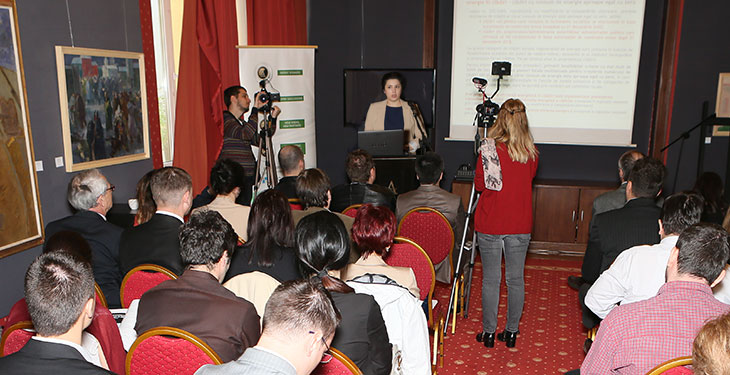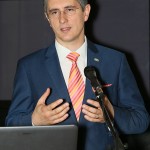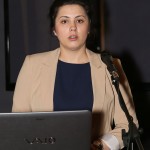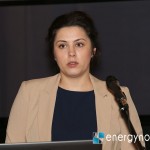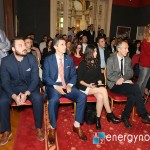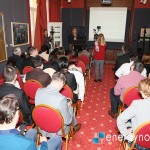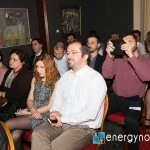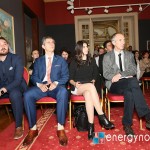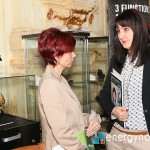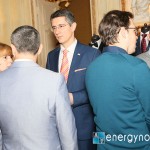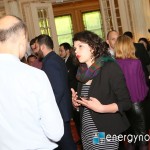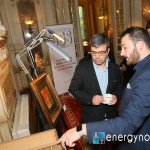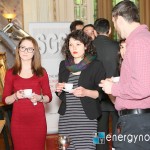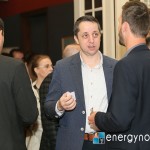A Secretary of State from Ministry of Regional Development and Public Administration (MDRP), an independent expert and two representatives of the private sector were the main actors of the Energy Breakfast Club meeting on Wednesday, April 27th, dedicated to solutions of increasing the energy efficiency in buildings. Four very different perspectives, enlightening from different angles one of the most pressing and full of opportunities sectors in the Romanian energy industry.
The talks were opened by Sirma Caraman, Secretary of State in the Ministry of Regional Development and Public Administration. Sirma Caraman presented the specific national and European measures that promote energy efficiency in this field, especially the national programs of thermal rehabilitation of housings and the actions to renovate the buildings owned by the central government.
The balance at end of 2015
Secretary of State Sirma Caraman informed the audience that in the period 2009-2015 there have been rehabilitated over 1.800 housing units (62.000 apartments). Most of these actions (thermal insulation of the building envelope, thermal rehabilitation of the heating system and hot water, the installation of alternative systems of energy production from renewable sources) were performed under the national program and led to a saving of primary energy by the end of 2015 of 97.7 thousand tep).
The number of buildings owned by the public administration (schools, colleges, universities, municipalities, local councils, ministries, other central administration units) exceeds 13,000, with a specific final energy annual consumption between 120 and 400 kWh/sqm.
DOWNLOAD SIRMA CARAMAN PRESENTATION
The law requires that 3% of the total area of buildings owned by the central public administration have to be renovated annually, with total useful areas of over 250 sqm. Sirma Caraman said that by the end of 2015 intervention works have been performed to 185 buildings and major renovations works to 97 buildings with calculated primary energy savings of 2,24 thousand tep.
From May 16th, can be submitted projects for residential buildings through POR 2014-2020
Through the Regional Operational Programme 2014-2020, Romania now has at disposal 1.18 billion euros for: 1) residential buildings (447 million euros); 2) public buildings; 3) public lighting. For making the residential buildings more efficient, the program was launched on March 15th, 2016 and the period of project submission will be from May 16th to November 16th, 2016. For the other two categories, the specific guides are still being developed. MDRAP expects to launch in public consultation the Specific Guidelines for public buildings in May 2016 and the submission of projects in November 2016. For the public lighting, the advanced deadlines are June 2016 for the public consultation launch of the Specific Guides and December 2016 for the submission of projects.
The main problem identified by MDRAP in accelerating these works is the lack of information and technical expertise at the level of local authorities and not necessarily the lack of funds. “Local authorities, most of them do not have the ability to write projects. After the elections this year, town halls will focus on attracting European funds and the private sector is required to support this process,” said Sirma Caraman.
Obligations regarding buildings with almost zero consumption, from 2018 and 2020
Sirma Caraman also referred to the amendments to the law 372/2005, which requires the development of buildings whose energy consumption is nearly zero, as follows:
- New buildings for which the reception upon completion shall be based on the building permit issued starting from December 31st, 2020
- Buildings owned/managed by the public administration to be received based on the building permit issued after December 31st, 2018
Benefits brought by buildings automation
Rafael Mărculescu, the President KNX Romania association, presented the advantages of automation systems for buildings in terms of energy efficiency. The main advantage is the elimination of unpredictability and of costs primarily induced by human action in terms of lighting, heating and ventilation in the living quarters, in the offices and in the industrial or commercial spaces. The most common automations are those based on:
- Timeout
- Motion/presence detection
- Detection of weather conditions: rain, wind, frost, sunshine
- Time programs (daily, weekly, etc.)
- Detection/maintaining the level of lighting in the room
The technological developments led the simple automation, based on a single appliance, to automation with centralized logic (simple or small applications, managed only by one computer for the whole building), and presently to automation with decentralized logic, in which various sensors and actuators communicate with each other via a linkage, within complex applications.
Rafael Mărculescu presented the advantages of KNX protocol, including the fact that it is an open international standard, with over 25 years of experience, free from any patent or trademark used by 400 manufacturers worldwide.
DOWNLOAD RAFAEL MĂRCULESCU PRESENTATION
Reactive energy – to be considered from the design stage
Elena Popescu, project manager at Elektra Invest, pointed out that in order to increase energy efficiency, “it is important to consider the effects of the reactive energy upon installations, upon buildings and upon the national network.”
The reactive energy is a physical effect of certain electrical components, to offset the electrical current from the voltage. The reactive energy cannot be consumed, thus the only way to get rid of its negative effect is the compensation through coils or condensers. “When we buy and install an LED lamp in a network to increase its energy efficiency, we must verify that it has within the starter an equipment to compensate the reactive energy that it produces,” exemplified Elena Popescu. Transformers and motors are big reactive energy producers, energy invoiced and paid, ultimately, by the user of the electrical network.
DOWNLOAD ELENA POPESCU PRESENTATION
Compliance with simple principles and inexpensive to implement, preferably from the design of the building stage, leads to energy efficiency and the reduction of costs, synthesized Elena Popescu.
Elektra Invest is a company specialized in the design and construction/maintenance of electrical installations, connection points and transformer stations, namely their operation and maintenance, including ongoing monitoring by an authorized dispatcher.
EFdeN – from dream to reality – the industrialization of the sustainable neighborhood
Claudiu Butacu, President of Bucharest Solar Decathlon Association, presented the new development stage of the EfdeN project. “The association has designed and built an extraordinary house: solar, safe and comfortable, very energy efficient, 100% electric and without monthly bills, a highly automated and environmentally friendly house,” said Claudiu Butacu.
Currently, the house prototype became the first Research Center in Romania for Comfort Conditions and can be visited every Thursday and Sunday at 66 Pache Protopopescu Boulevard.
Claudiu Butacu detailed one of the most challenging projects of the Association – EFdeN housing industrialization. “We want to achieve a green and safe residential complex with smart urban planning with housing of 2, 3 or 4 single rooms or duplex-style rooms, where people are happy, healthy and safe in a home 100% electric without monthly bills.” The EFdeN proposal is designed to solve the problem of mobility and density faced by cities by creating urban development poles.
DOWNLOAD CLAUDIU BUTACU PRESENTATION
“Unfortunately we do not realize the seriousness of the situation in which we find ourselves in terms of the environment. Since 2020, the European requirements regarding the energy efficiency and environmental protection, must find us prepared,” insisted Claudiu Butacu. “For now, our idea echoes more abroad of Romania, from potential investors and partners from Ukraine, The Republic of Moldova, England and Germany, who are interested in building such a neighborhood. In Romania, most of the people I talked with focus more on the cost reduction rather than complying with the standards of efficiency and quality of habitation”, said Claudiu Butacu.
Over 50 representatives from ABB, Electrica Furnizare SA, AFAPLAN ENGINEERING SRL, C&C Group Company, Safetech, Vestra, Can Power, Marc and Sons, Asociaţia KNX, Cabur, CEMS, Colliers, Eco Therm, EFdeN, Electrica Furnizare, Elektra Invest, ENERGY CONTROL, ENERO – Centrul pentru Promovarea Energiei Curate şi Eficiente în România, ENGIE Servicii S.R.L., Gewiss, Golden Light , Guna & Rosh Construct, Hoval, LINDAB, Marsh România, Ministerul Dezvoltării Regionale şi Administraţiei Publice, Ministerul Energiei, MT&T Property Management, Next Gen, Ridgid Tools, Roa Grup, Romexpo, SII România, Skanska, Unilever, Vestas attended the presentations and participated in discussions.
The event was organized by energynomics.ro and supported by our partners: Consiglieri, Elektra Invest, Ridgid, SGS România. Opening the long-term partnership with energynomics.ro, Cezar Ionaşcu, Head of Sales at Consiglieri, introduced those present with the Consiglieri world by exposing some starting ideas on the secrets every gentleman should know about for a strong visual impact.
PARTICIPATION
This year, energynomics.ro aims to organize at least 6 more Energy Breakfast Club meetings. The schedule and the proposed themes are here.
